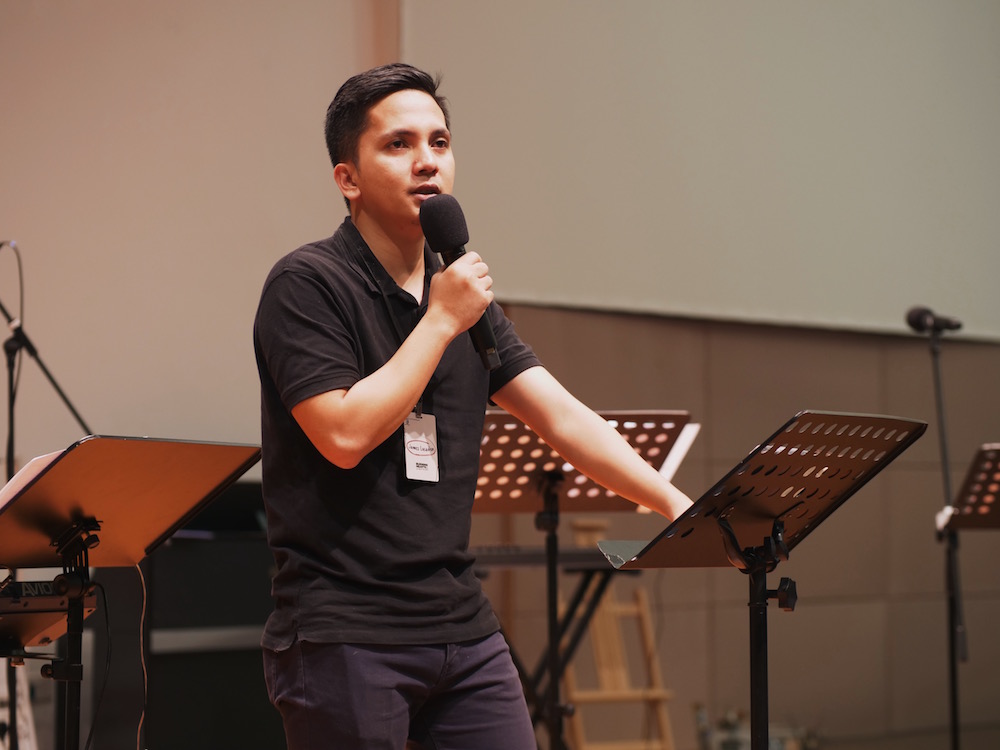Taking the stage on the last day of the Burning Hearts Conference 2019, James Lee Lacaden, who founded the Vigan House of Prayer in Northern Philippines in 2013, was a picture of a man among giants.
“I’ve not gone to seminary or done an internship with the International House of Prayer,” he joked, laughing with his fellow speakers who had gone before him – Jess Shao, Elijah Choi, John Kim and Josh Yeoh. The collective years of ministry seated in the front row undoubtedly held its weight – probably even longer than Lacaden’s own life.
“Most of us want things that are big and grand,” he continued, drawing attention to Matthew 13, where Jesus compares the Kingdom of Heaven to a mustard seed, yeast, treasure hidden in a field and fine pearls.
You then realise his previous jest is all part of the message.
“But the Bible says the Kingdom of God is in the small things,” said Lacaden. “What we find insignificant in our eyes is very significant to God.”

We observe the ways of God through the Word: What could be less significant than a baby born in a manger? Or a small praying community in an upper room? What about a small nation, surrounded by global superpowers?
And when we sign up to be all out with Him, God brings us into the wilderness to teach us this reality.
Lacaden explained: “Most of us want something that is big and grand, but the parables show us that the Kingdom of God is small, hidden and extravagant.
“Small, such that not everyone can see it. Hidden, that you need to go and find it. Extravagant, that you must give it all to love wholeheartedly.”
“One thing I ask from the Lord, this only do I seek: that I may dwell in the house of the Lord all the days of my life, to gaze on the beauty of the Lord and to seek him in his temple.” (Psalm 27:4)
Seeking the Kingdom of God calls for the “one thing” lifestyle, as King David talks about in Psalm 27:4.
The encouragement is that no matter how small or insignificant one might be in the Kingdom, God sees you, Lacaden said.
He then elaborated this with three biblical examples: David, Elijah and John the Baptist.
DAVID: FORGED IN THE FIELDS
David’s ‘one thing’ lifestyle didn’t start when he was king, when he had everything and was famous. It started when he was in the hills of Bethlehem, looking after a few sheep and cultivating his intimacy with God.
“It started in his hidden years, when he had nothing great in the eyes of man,” Lacaden said. “His heart was moving for God and that was enough.
“He became a great musician, a great warrior, a lover of God – not in the palace, but in the field.”
Through searching the hearts of all the men of Israel, God found His king, singing to him with all his heart in the quiet hills of Bethlehem.
Even to his own family, David was unseen. The runt of the litter, he had achieved nothing that would qualify him to even stand before the prophet Samuel when the latter was selecting Israel’s king from Jesse’s seven other sons who were older, taller and more handsome (1 Samuel 16:1-13).
But God rebuked Samuel for looking at the outward appearance. It’s not physical stature or even a physical ministry that God looks at – He looks at the movement of our hearts and whether we’re growing closer to or further from Him.
And through searching the hearts of all the men of Israel, God found His king, singing to him with all his heart in the quiet hills of Bethlehem.
“David was not invited to the party. He was out there in the fields taking care of sheep,” Lacaden said. “And the Lord knew where to find him.
“You hidden ones, the Lord knows where to find you, wherever you are.”
This reality removes the fear of not being recognised, of not being promoted or seen. There’s no need to rush or compete for platform; keep hidden until God says it’s time, he urged the audience.
“I believe David was chosen because he had no ambition to be the next king. God wanted the purity of his heart, which had no other agenda but his ministry to God. David was fully satisfied in the hills singing, he didn’t need to be king.
“That’s why he was chosen to be king of Israel.”
ELIJAH: FORGED FOR THE NATIONS
“Elijah represents forerunners who are forged in the hiddenness who will manifest the power of God among the nations,” Lacaden continued.
“In 1 Kings 17, Elijah suddenly appears. There’s no record of where he came from, but I believe God was hiding him and forming him until his time of public ministry.”
We know Elijah as possibly the most powerful of the Old Testament prophets. He could hold the weather with his words, sending drought upon the land because of an evil king. But by the third verse we observe God sending him back into the wilderness to hide.
“The hidden years were important for Elijah to learn not to rely on his anointing or power but on God alone.”
“Elijah could have objected to this sending back, to be fed by ravens (1 Kings 17:6) and a widow who couldn’t even feed her own son (1 Kings 17:8-16),” Lacaden said. “But the hidden years were important for him to learn not to rely on his anointing or power, but on God alone.”
God spoke clearly during those years of hiding, and having to rely on the word and instruction of God alone is what makes a prophet. “God will bring us into our hidden years so that we don’t trust our positions or titles,” he said. “He is always after your heart.
“That’s why He brings us into seasons of smallness and hiddenness so that we can be grounded in His Word and love – not destroyed by the anointing He is giving us.”
JOHN THE BAPTIST: FORGED FROM THE WILDERNESS
“Why did God put John in the wilderness rather than the temple?” Lacaden asked the crowd to consider. “His father, Zechariah, was a high priest. His mother, Elizabeth, was in the lineage of Aaron, the first High Priest.”
“John was a burning and shining lamp not because of his ministry to people, but because of his ministry to God.”
And practically speaking, John could have had more influence ministering in the synagogues. But Lacaden believed this was because God wants His holy priesthood to minister before Him first, before people. And this takes training in the wilderness, where there is no distraction.
“He was a priest before God. This was his main occupation,” Lacaden said. “John was a burning and shining lamp not because of his ministry to people, but because of his ministry to God.”
He continued: “It is profound that the greatest commandment is to love God with all our heart, soul and mind. He wants us to love Him and give it all for Him!
“The main goal of the Great Commission is not the salvation of every tribe and tongue – it’s that every tribe and tongue will come before Him and worship and love Him.”
It’s written in Scripture that God will shake the heavens and the earth so that only Jesus will be glorified, loved and worshipped above all at the end of days (Hebrews 12:26-28), Lacaden said.
Are we burning with love for only Him, content to be nameless and faceless, part of the great multitude who have overcome and emerged from the great tribulation in Revelation?
“After this I looked, and behold, a great multitude that no one could number, from every nation, from all tribes and peoples and languages, standing before the throne and before the Lamb, clothed in white robes, with palm branches in their hands…” (Revelation 7:9 ESV)
The Bible doesn’t record specific individuals – no names or faces – in this great multitude.
“This is my call, specifically to the hidden ones,” Lacaden concluded.
“Be faithful even in the season of smallness, ministering before the face of the Lord, so that in the end He will say to us: ‘Well done, my good and faithful servant.”
- Do you feel unseen, hidden and in an insignificant ministry?
- How can we be faithful in the small things and have the right heart?
- What is God calling you to do for Him in this season?









